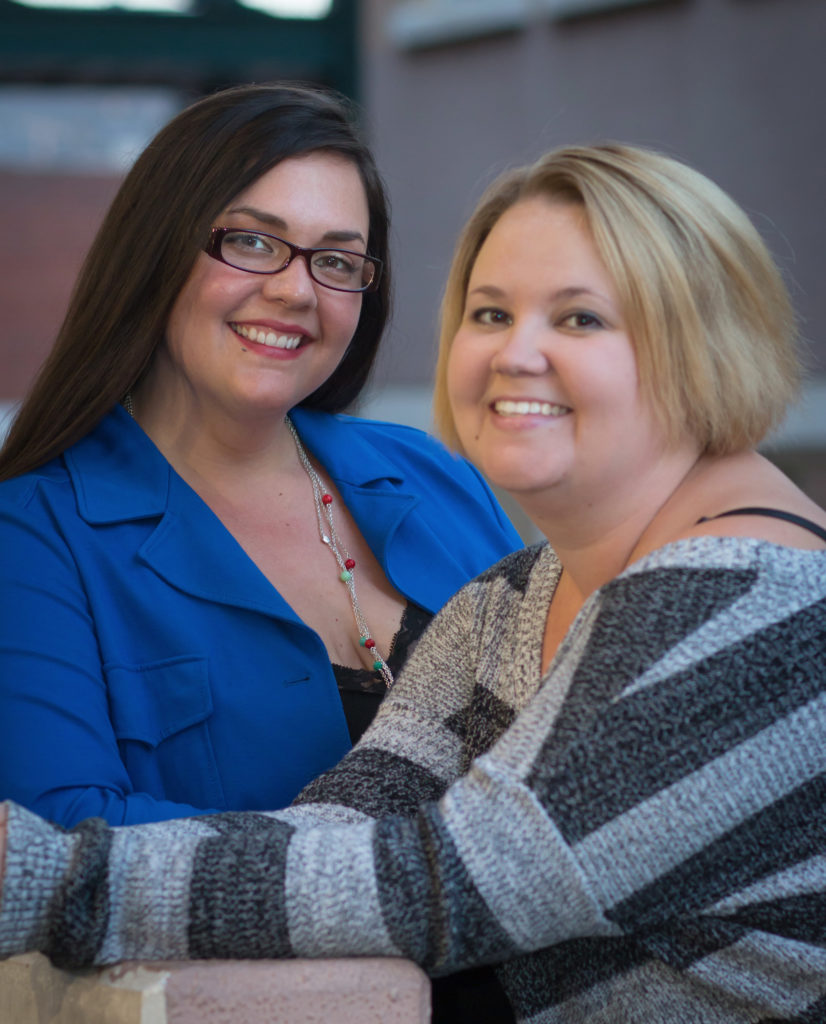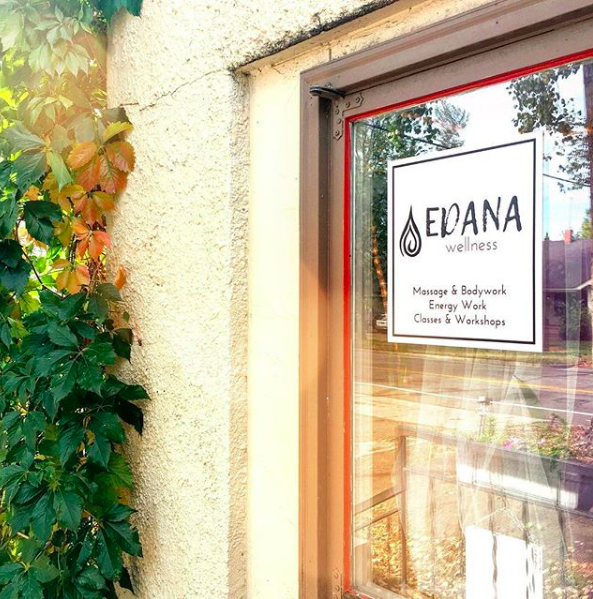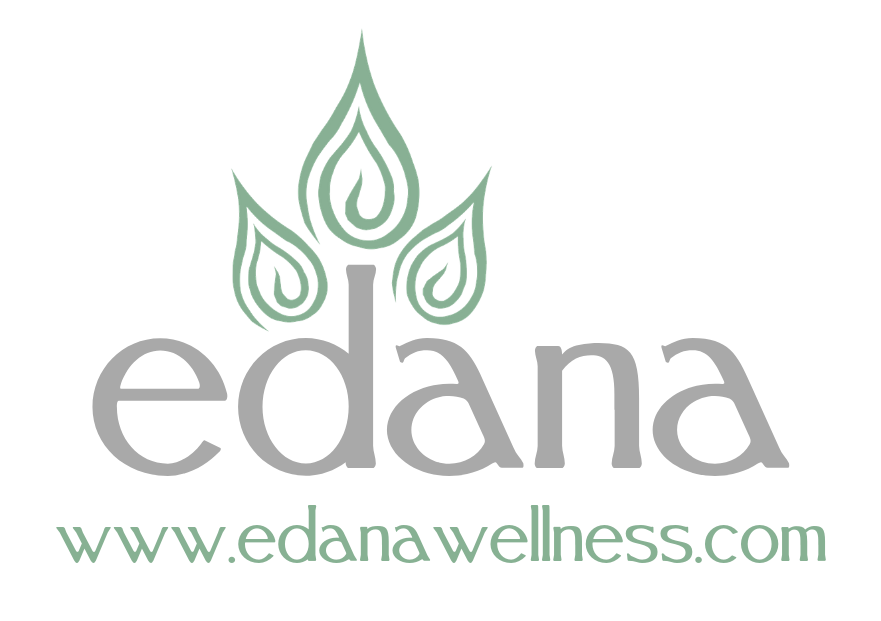By: Zora Satchell and Shirley Coenen
We sat down with the founders of Edana Wellness, Victoria Benjamin and Ali Owens where we talked about the intersections between white supremacy, institutionalized european-christianity- and the joy, excitement and difficult work that healing justice offers us.
This is a sneak preview of the more in depth practice, coming up at our Healing Justice Workshop on Saturday, April 13th. Please join us and RSVP!

Victoria Benjamin on the left and Ali Owens on the right. Photo courtesy of Victoria Benjamin.
What do you define as healing justice and why is it important to you?
Victoria Benjamin (VB): I feel like the overarching theme of healing justice lies in healing from the trauma and pain of systemic oppression. This work takes place on multiple levels.
First, individuals may work to heal their own physical, spiritual, energetic, and emotional bodies in a variety of ways that include contending with their victimization as well as the ways they are complicit in perpetuating the pain and oppression of other people.
Secondly, humans working toward healing justice may choose to help other individuals and communities heal from pain and trauma. I personally believe that this work is crucial in all communities and must be navigated in ways that do not perpetuate systemic oppression.
For example, White people do not need to enter and attempt to “rescue” communities of Color, because it is problematic on multiple levels and there is a great deal of healing work that needs to be done inside of White communities by White people.
I find healing to be a fundamental piece of social justice work. I wholeheartedly believe that we cannot harm others unless we choose to become blind to their humanity. And, on a similar note, we cannot harm others without losing pieces of our own. For me, healing justice offers opportunities to come closer to our own humanity while insisting we acknowledge and celebrate the intrinsic worth that lies in other people. Moreover, it insists we work to stop causing others harm.
Ali Owens (AO): Healing Justice, to me, describes the process of contending with our own passive or active perpetuation of oppression and judgment, AND acknowledging the trauma inherent in that perpetration. Coming to terms with the fact hat we can be both oppressed and oppressors is no easy task, and this process of self-examination requires extensive spiritual and emotional healing. Until we commit to doing the inner work, I believe we cannot be as effective in healing the many injustices that exist in our world today. Just as the health of one cell affects the body as a whole, so too does the spiritual and emotional wellness of the individual affect the collective conscious.
How does this connect to decolonizing spirituality?
AO: Decolonizing spirituality requires white folks to examine our areas of privilege and our societally-informed entitlements to significant spiritual practices of marginalized groups.
By focusing on Euro-Pagan practices, we hope to offer white people in our community a chance to connect with ancient wisdom from our own ancestors and integrating that wisdom into our lives in a way that honors the sacredness and divinity of every human being.
VB: I am a White woman who was raised in the Christian church. Throughout my personal journey, I found Christianity to be extremely patriarchal and rigid in gender, sexuality, and many other social identities. As I began to gravitate toward Paganism, I also felt a great deal of fear because of the negative connotations involved with it, like Satanism and Witchcraft.
Now, I am in no way saying White people should not be Christian or that the church is necessarily bad. Not at all. But, I think that it is important for white women to name the harm that the church - and white men - have caused us.
Throughout history and still today, things like witch hunts, executions, and extreme physical and sexual violence have been enacted on White women and children. What’s more, violence was used to steal our spiritual practices. Even today, we see abuses like sexual assault against children and nuns in the Catholic Church being talked about more and more. There are so many different examples like these in our communities. So, in this way, it becomes necessary to name and deal with our spiritual victimization.
White folks in the U.S. overwhelmingly identify as Christian. It is important to also name and contend with the brutality of our collective history and the harm this has caused other people, no matter how uncomfortable it may be.
For example, White colonizers literally used their faith as justification for slaughtering Native Americans and enslaving African people. Rape and other forms of violence against people of Color were - and continue to be - commonplace. Another example of this harm can be found in the GLBTQQA+ community.
I mean, look at the Westboro Church and conversion camps. And, trans women of Color are at higher risk of violence and homicide than other demographics. It becomes clear that a Christian society is still harming people right now.
Remember earlier, when I talked about White people contending with both our victimization and the ways we perpetuate harm against others? Well, spirituality is a prime example of this work for these reasons and so many more.

Edana Wellness, photo from Edana Wellness Instagram.
Many White people do not identify as Christian, though. But, I often see them try to find alternative spirituality through other means, like in the practices of communities of Color. Now, I think White people can practice certain spiritual practices if they do so carefully and respectfully, while others are inappropriate to practice. We will open up dialogue about this at our discussion on April 13th.
The answers White people seek about their own souls and humanity can be found by other means [than cultural appropriation]. Focusing on a European-based practice allows White people to look to their own roots - those that existed before forced religion and colonization - for healing. This can be a way to reclaim what has been stolen from us as well as allow us a way to practice spirituality in ways that are not appropriative - and not harmful - to communities of Color. In this way, we can begin to decolonize our spiritual practices and move more gently in the world - and perhaps even change it.
AO: I, too, am a white woman who was raised in the Christian church, where I internalized misogyny, bigotry, and intolerance. The things I was taught in church caused me significant trauma around my own sexuality, identity, and roles, and the scars have lasted decades. I separated from the church as a teenager, but the burden of shame remains imprinted in my brain to this day.
Overall, the sad truth is that so many atrocities committed today are rooted in white American Christianity. We see it every time we turn on the news. Bigotry. Misogyny. Discrimination. Hate crimes. Doubled-down pressure toward maintaining limiting and harmful gender roles. Ostracizing and criminalizing those in the LGBT community. For those of us who no longer wish to perpetuate these problems, being able to identify with alternative spiritualities has become increasingly important - but equally important is being able to do this without co-opting, trivializing, or disrespecting the spiritual practices of people of color.

How do you connect this with your company Edana Wellness?
VB: Edana Wellness seeks to help others heal from trauma and find empowerment through earth-based spirituality. Specifically, we focus on European-based Pagan philosophy because we both identify as White women and find it important to work within our own community, and because we both embrace Paganism as our spiritual practice. We currently offer workshops to help folks with healing and personal empowerment and, soon, we plan to offer a variety of services and opportunities that align with that vision.
AO: As Victoria said, Edana Wellness seeks to help others heal from trauma and find empowerment through earth-based spirituality; specifically, Euro-Paganism - and we do so through a lens of intersectional feminism.
We believe healing is not complete unless it examines the intricacies of oppression that have been woven into the fabric of our culture. In this way, we aim to address the root of the wound, not just the symptoms.